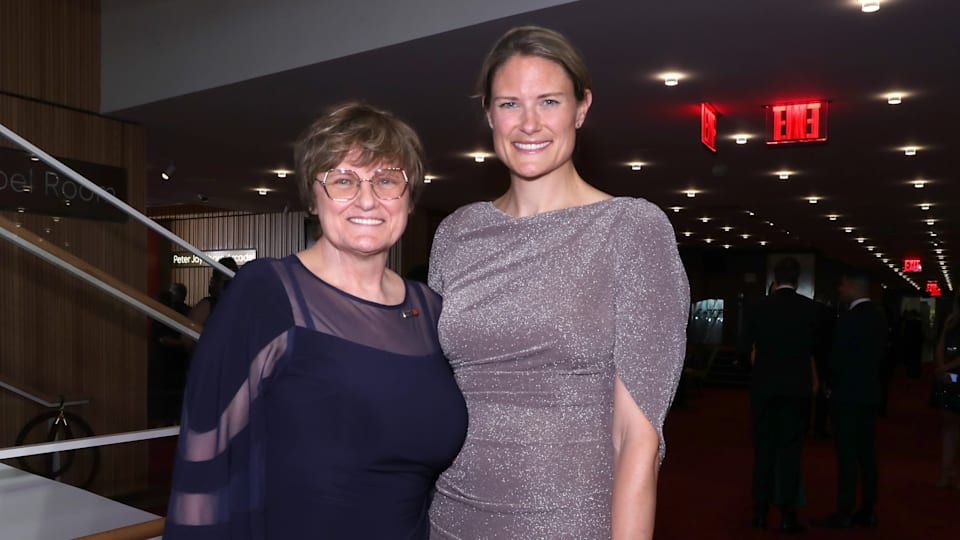Olympic rowing champion Susan Francia and her Nobel Prize-winning scientist mother Katalin Karikó on perseverance and supporting each other
Karikó received the Nobel Prize in Stockholm on Sunday 10 December

Susan Francia is a two-time Olympic gold medalist, part of the successful USA women’s eight rowing crews at Beijing 2008 and London 2012.
Her mother, Katalin Karikó, was there for each of Francia’s accomplishments. She took pictures and yelled for her daughter as any proud mother would.
Karikó is one of the two researchers who found that mRNA could be used to vaccinate people against COVID-19, helping slow the coronavirus pandemic. She’s won a host of awards and honors for this achievement. Along with her research partner Drew Weissman, Karikó was given the Nobel Prize for Medicine in Stockholm on Sunday 10 December.
Now, it’s Francia’s turn to take pictures and cheer her mom on. She posted one photo on Instagram where her mother was speaking, and the actor Chris Pine looked on with admiration.
"We've flipped the script. We joke that my mom used to be known as Susan Francia’s mom, and now I'm known as Katalin Karikó’s daughter,” Francia shared, exclusively to Olympics.com about the latest family achievement.
"It was more what we put into it"
“We're happy for each other's success," Francia continued. "At the end of the day, it was more what we put into it. That's, I think, special to us. My mom has these beautiful awards and a trophy case. If none of that would have existed and she would have just had the success of helping patients, I think that is really what was the most important and same for me. Just being there and growing and knowing that for that one moment in time, I was the best in the world. Even if there had been no flashy medal or all of the Olympic fun and glory.”
For Francia, success in sports didn’t come easily. Standing 187cm tall (6-foot-2-inches), she tried every sport in high school where height would help, but none really stuck for her.
It wasn’t until college that she gave rowing a shot. In her sophomore year at University of Pennsylvania, Francia joined novice rowing, and found the right sport. With the U.S. women’s eight, she won two Olympic gold medals and four world championships.
"People ask me about what was my feeling when Susan won the gold medal," Kariko told us. "And I kind of felt relief, because they did not realize that for years, every morning she was calling me after training races.
“I was always prepared if it didn't go well. And then I would say some encouraging words that maybe tomorrow, and some encouragement when something wouldn't work the way we expected. I was always ready to give her some little talks and encourage her.”
Continuing after funding cuts and a demotion
Karikó ran into roadblocks as she researched messenger RNA. She started her work in Hungary in the 1980s, before she, her husband Bela Francia, and a two-year-old Susan immigrated to the United States. Working at Temple University and then Penn, Karikó continued to learn everything she could about messenger RNA and its applications. Over the years, her funding was cut. She was demoted. But Karikó was confident in her work.
“Other people thought that I am not successful and it's not working. But when I was working at the laboratory, I could see the progress and I felt very happy. I could see what it is, that it is getting better and better,” Karikó said. “Other people couldn't see that, so that's why they were skeptics. But at the beginning, really, the mRNA was not that good. I worked a lot on it and some colleagues also and eventually it became much more powerful.”
It’s a struggle Francia understands. Olympic athletes train and compete for years without much fanfare. Mother and daughter both found they had to find joy in the work.
“Being on the podium was great. And it's so wonderful to hear the national anthem but being in there every single day and the grind, that was fun. Being around my teammates and surrounded by that team aspect and doing something really special. I think I’m similar to my mom,” Francia said.
"I realize how much patience she had"
Now that Francia has retired from rowing, she is sharing another experience with her mom. Francia has two young children of her own.
“I realize how much patience she had. I also laugh with my Olympic teammates because a lot of them are also parents. And we joke that training for the Olympics, we thought that was the hardest thing that we would ever have in our lives. No, no. Being parents, that takes the cake. I don't think I've ever been so tired in my life. But it's also very rewarding and it's been really fun,” Francia said.
For Karikó, even though she has won so many awards in science, her work with mRNA is far from over. She attended a conference in Berlin in November that was just focused on mRNA’s many applications. Karikó said mRNA is now being tested to treat everything from cancer to malaria to peanut allergies.
“We heard presentations of different applications, different viral vaccines that are under development and also against bacterial and parasites, like malaria, and as a vaccine to put therapeutic or preventive manner. And also we have seen many of the cancer vaccine presentations. We have seen clinical data show how the field is moving forward and where it is. You can see success,” Karikó said.
Francia is happy that so many people are benefiting from her mother’s work.
"My mom, when she went from academia into the more commercial setting, her goal was to help at least one patient. So it's been incredible to see just the progress and even where the future is.”
